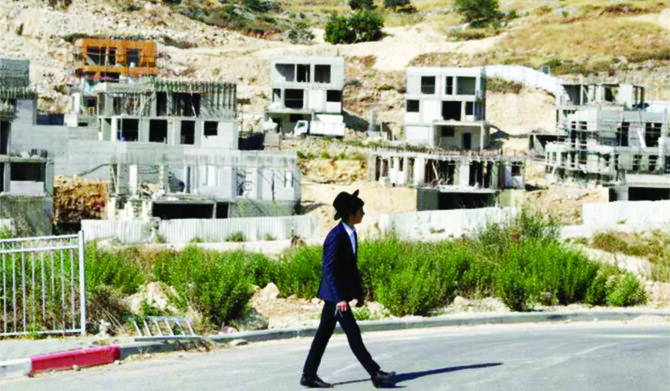JERUSALEM: Prime Minister Benjamin Netanyahu condemned on Sunday Jewish settlers who attacked senior Israeli military officers including Maj. Gen. Avi Bluth, the head of the army’s Central Command in the occupied West Bank.
The Israeli army said that a group of settlers trailed Bluth and other officers in the West Bank city of Hebron on Friday, blocked their exit and hurled abuse at them. It added that five rioters had been arrested.
“All violence directed against Israeli military officers and soldiers must be dealt with to the fullest extent of the law,” the prime minister’s office said in a statement.
Some of the crowd yelled “traitor” at Bluth, who had visited Hebron to attend an annual religious event in the city.
BACKGROUND
On Saturday, dozens of settlers hurled stones at Israeli troops near the West Bank settlement of Itamar, police said.
On Saturday, dozens of settlers, some of them masked, hurled stones at Israeli troops and border police near the West Bank settlement of Itamar, police said.
There has been a general surge in violence across the West Bank since the Oct. 7, 2023 attack by Hamas militants on southern Israel.
Palestinians have been repeatedly targeted by settlers, who want Israel to annex the West Bank. The Israeli military is meant to protect the local Palestinians, but Bluth acknowledged in August that the army had failed to safeguard civilians when settlers went on the rampage in one town. Palestinians say they are often left to the mercy of the settlers, with soldiers doing little or nothing to rein them in.
Some settler youth groups reject the jurisdiction of the Israeli military in areas that they see as under their control and have attacked Israeli forces.
Settler leaders have said violence has no place in their movement and have called for offenders to be prosecuted.
Most countries deem Jewish settlements built on land Israel captured in a 1967 war to be illegal. Israel disputes this and cites historical and biblical ties to the land. Palestinians want the West Bank as part of a future independent state.
Separately, analysts and officials have said Israeli Prime Minister Benjamin Netanyahu is facing legal perils at home and abroad that point to a turbulent future for the Israeli leader and could influence the wars in Gaza and Lebanon.
The International Criminal Court stunned Israel on Thursday by issuing arrest warrants for Netanyahu and his former defense chief Yoav Gallant for alleged war crimes and crimes against humanity in the 13-month-old Gaza conflict.
The bombshell came less than two weeks before Netanyahu is due to testify in a corruption trial that has dogged him for years and could end his political career if he is found guilty. He has denied any wrongdoing.
While the domestic bribery trial has polarized public opinion, the prime minister has received widespread support from
across the political spectrum following the ICC move, giving him a boost in troubled times.





















